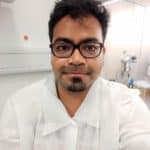-
Asked by amelia crush on 10 Jun 2024.1
-
Neil Barnby answered on 10 Jun 2024:
It would really depend on what kind of scientist you want to become. Science is very much about curiosity, so being curious is a great start. Mathematics is also an important part of all sciences, so you should study that. After that it is subject specific. For me, in Computer Science you need to learn about computer programming, computer science and problem solving.
-
-
Elpida Vounzoulaki answered on 11 Jun 2024:
Programming! It is one of the most important skills you can have as more and more jobs are becoming more tech-based. It unlocks doors for more career opportunities and it is a transferrable skill, meaning you can use it between jobs, if you change jobs and careers over time.
-
Fran Biggin answered on 17 Jun 2024:
There are many different branches of science, so what you need to learn depends on what you are most interested in. The common thread to all sciences though is to be curious and to apply the ‘scientific method’ of posing a question, formulating a hypothesis, and then testing that hypothesis. If you have curiosity and an open mind about the possible answers to the questions you have, then you have the foundations for becoming a good scientist.
-
Ravindu Ranaweera answered on 9 Jul 2024:
Learn a programming language. If you are completely new, try Python (easy, free and plenty of resources but very versatile with very wide applications). Even if you end up using different languages, the skills will be easily transferable.
Related Questions
How long have you been a scientist for
do you play any science games maybe on ps xbox to help yu out
what is the funniest thing about science?
How did you become interested in science when you were growing up?
hey! i just saw you profile, and you looked pretty cool. just curios, what's your favourite typre of science (eg.
if you where not a scientist what would you be?
Is it useful to play Dota 2? will this help me in the future?
how old were you when you loved science
Did you think you would be a scientist when you grew up?
Latest Questions
-
How do you make new drugs
-
how many plants do you study normally?
-
what happens when a person whos sick gets a DNA while the person is sick what do you do
-
What are polysaccharides?
-
how many nuclear explosions happen in the world
-
how does your job effect your daily life ? (2 Comments)
-
why does nuclear waste glow in the dark? (1 Comment)
-
how to you deal with problems you come across when doing your research? (2 Comments)
-
If you have been emotionally invested (focusing on anxiety if you suffer with it, dementia etc) do you find it
-
what motivates you to carry out your research? (1 Comment)
Latest Comments
-
how does your job effect your daily life ? (2 comments)
-
why does nuclear waste glow in the dark? (1 comment)
-
what motivates you to carry out your research? (1 comment)
-
how to you deal with problems you come across when doing your research? (2 comments)
-
How long have you been a scientist for (2 comments)







Comments
Kirsty L commented on :
The top 2 skills I learnt at school I use every day are:1. putting a title and date and experiment diagram in my lab book, so I know what my notes are about and when I took them and how i set up the equipment, and 2. that it’s always ok to ask questions, because that is how we learn!
I really wish my teachers knew i’d set my real lab book out like my science workbook LOL
angeladouglas commented on :
I agreed that being curious and wondering why are important. Pick something that really interests you and explore more. Do research – ask people, explore online, do your own tests/experiments even an accident can be useful (how penicillin was discovered!) and observe note what happens or does not happen (sometimes nothing changing or very small minor/minor changes are really important to note, ideally record – writing/photos/voice notes with time/date). Try to work out what might have caused that change or made a difference. I’m a forester and that covers a very wide range of range of fascinating topics. Everything from lab work to outside nature to timber structure or preservation or chemicals or soils or water or climate change and a whole lot more!
David B commented on :
Ask questions. Science is all about asking questions, the answers to which can lead to more questions and so on.
One of the most important skills you can develop at school is communication. Good communication helps everyone pull in the same direction and achieve common goals, poor communication can lead to chaos.
sandrarobertson commented on :
Don’t be put off when things go wrong, sometimes you learn a lot more about an experiment or topic by what has gone wrong, rather than always being right. If you want to find a job in science after school, you will have lots of ‘gone wrong’ moments, but it just means you are closer to getting it right the next time and get to try again. Keeping thinking why did that happen, and you’ll be on the right path. And the boring bit – you will need maths, and you will need good reading and writing skills, and you have to be willing to listen to instructions, but it can be fun learning.